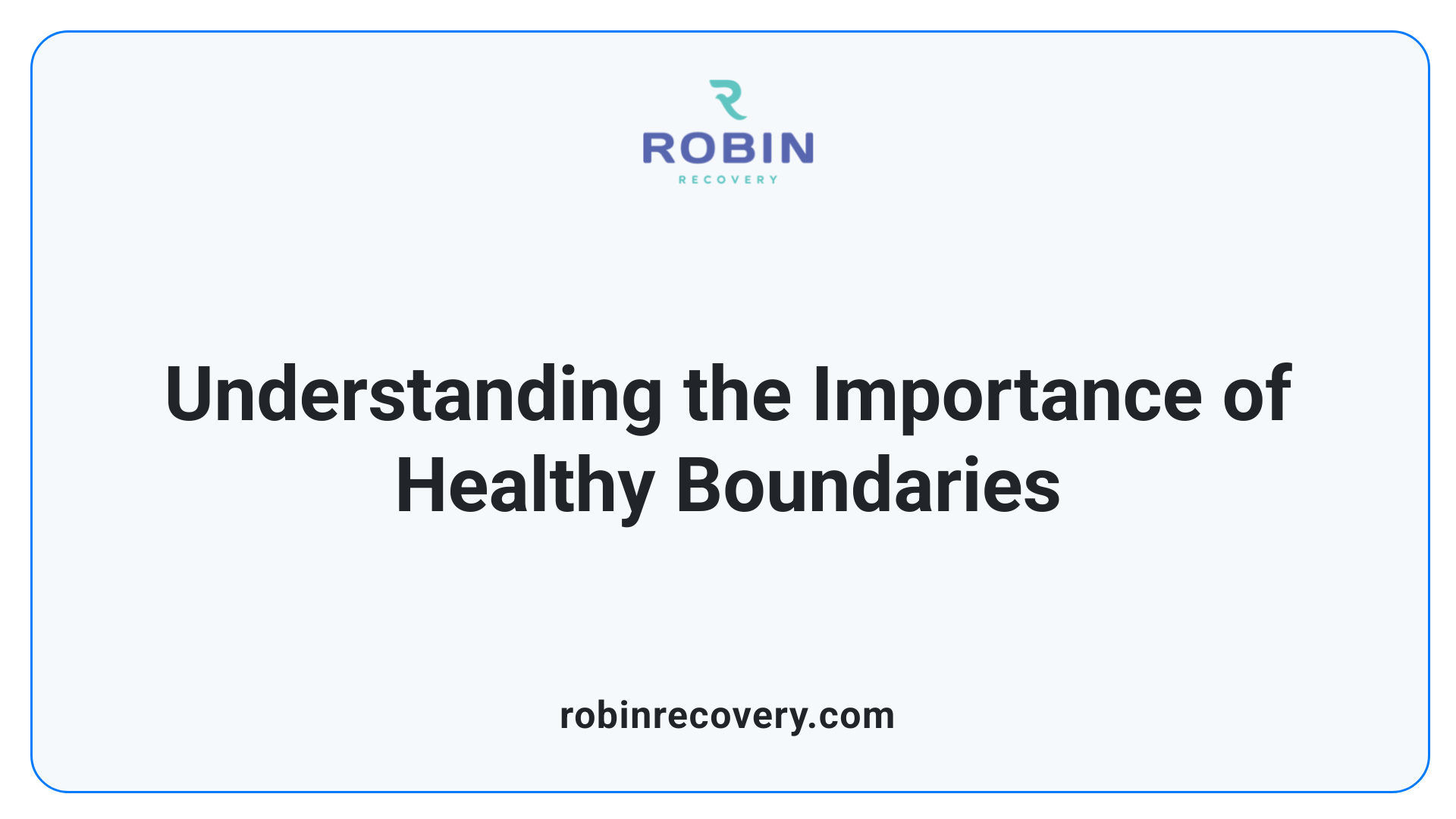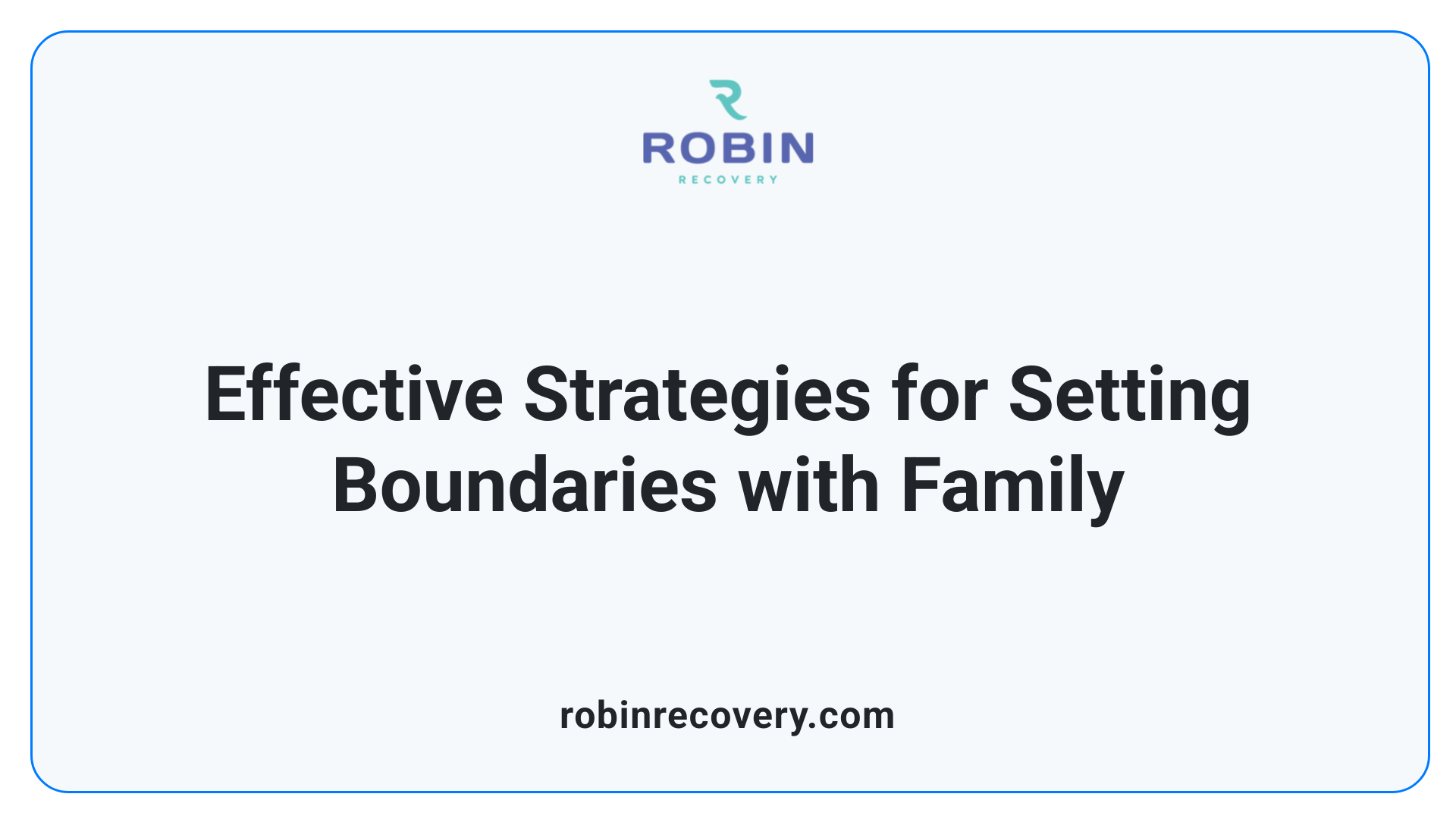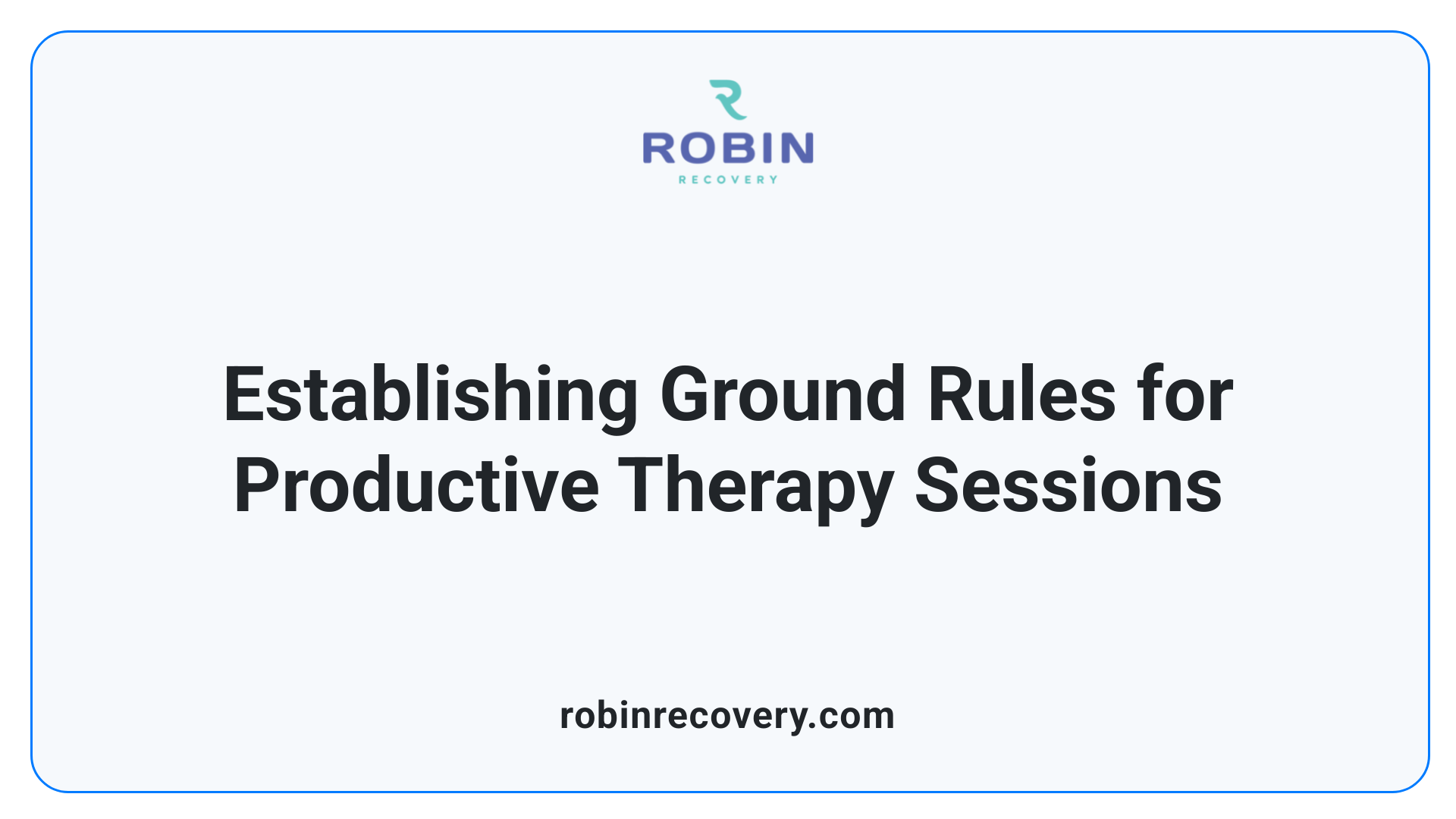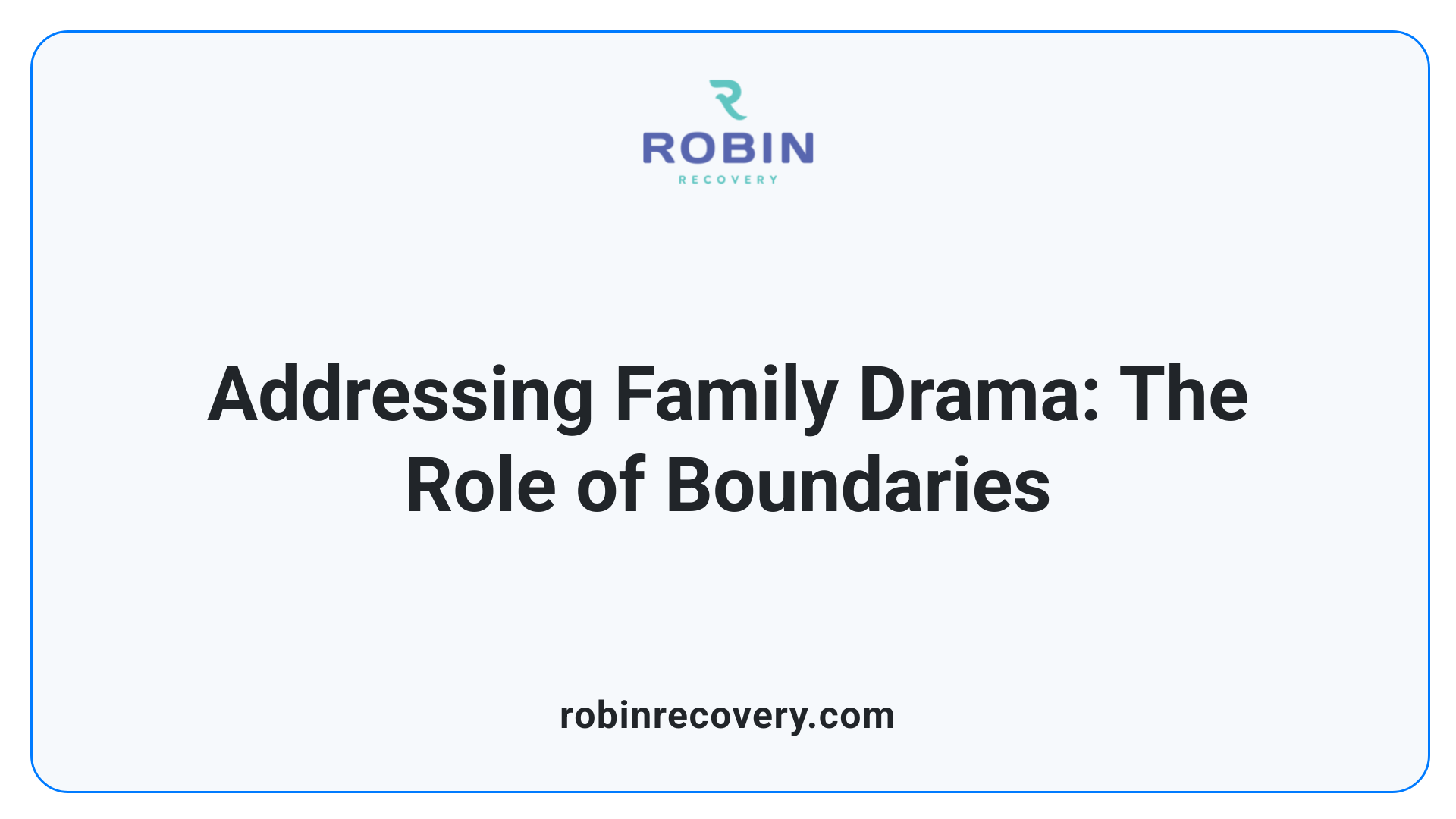How to Set Healthy Boundaries During Family Therapy Sessions

Understanding the Importance of Boundaries
In family therapy, setting healthy boundaries is crucial for nurturing positive dynamics and ensuring each family member's well-being. Boundaries maintain emotional, physical, and psychological limits that protect individuals while facilitating open communication. They also prevent emotional manipulation, help tackle family dramas, and support conflict resolution, creating a healthier family environment. This article explores the importance of boundary-setting during family therapy sessions and offers practical strategies to implement them effectively.
What Are Healthy Boundaries in Family Therapy?

The Definition of Healthy Boundaries
Healthy boundaries in family therapy are emotional, physical, and psychological limits that individuals establish to protect their well-being while affirming their identities within the family unit. These boundaries lay the groundwork for respectful interactions and clear communication among family members. They can vary from defining acceptable behavior to stating personal needs explicitly.
The Significance of Boundaries in Family Dynamics
Boundaries play a vital role in sustaining emotional health and fostering positive family dynamics. By outlining how one desires to be treated, boundaries prevent emotional burnout and manipulation. They encourage members to voice their opinions without fear of conflict. This clarity supports conflict resolution, allowing discussions to unfold calmly and constructively.
Enhancing Independence and Preventing Codependency
Healthy boundaries promote individual autonomy, enabling family members to pursue their goals without the weight of external pressures. This delineation of personal space and responsibility mitigates the risk of codependency, where one member overly relies on another for emotional support or validation. Establishing and respecting these boundaries is crucial for each member's growth and development in a healthy family environment, ensuring that everyone can thrive.
Essential Examples of Boundaries in Therapy

What are examples of healthy boundaries in therapy?
Setting healthy boundaries in therapy is crucial for sustaining a therapeutic relationship that fosters trust and well-being. Some practical examples include:
- Declining Uncomfortable Tasks: Therapists may refuse to engage in tasks or emotional labor that exceed their capacity. This establishes a clear line between personal limitations and professional responsibilities.
- Expressing Feelings Responsibly: Addressing any discomfort directly and respectfully helps maintain open communication, allowing both parties to navigate potential issues collaboratively.
- Maintaining Emotional Boundaries: Therapists need to assert their limits to prevent feelings of resentment and guilt that arise from overstepping their emotional capacities. This keeps the therapeutic space safe and supportive.
The role of emotional boundaries
Emotional boundaries are essential in therapy as they protect both the therapist and the client from emotional burnout. By knowing when to say no, therapists can maintain their mental health, which is necessary for providing effective support to clients.
Creating an atmosphere where both parties' emotions can be acknowledged without pressure ensures that therapy remains a constructive and non-overwhelming experience. This helps clients understand their own emotional limits and encourages them to express their feelings without fear of overburdening the therapist.
Using 'I' statements in therapy
Communicating boundaries using 'I' statements is a powerful technique within therapeutic settings. For instance, instead of saying, "You make me feel overwhelmed," a therapist might express, "I feel overwhelmed when we discuss these topics without prior context." This approach reinforces mutual understanding without assigning blame and paves the way for a healthy, collaborative dialogue.
Overall, establishing clear and respectful boundaries is vital for nurturing a trusting and effective therapeutic relationship. This practice not only safeguards personal well-being but also enhances emotional health for both clients and therapists.
Strategies for Boundary Setting with Family Members

How can you effectively set boundaries with family members?
To effectively set boundaries with family members, it’s essential to begin with self-reflection. This can often be achieved through journaling or meditation, allowing you to clarify your needs and values in the context of family relationships. Understanding what feels acceptable and what doesn’t is the first step in establishing effective boundaries.
Next, when you communicate your boundaries, aim for clarity and calmness. Using 'I-statements' can help express your feelings without placing undue blame or fostering defensiveness. For example, saying "I feel overwhelmed when plans are made without consulting me" can open a dialogue rather than create a confrontation.
Why is consistency important when setting boundaries?
Consistency is vital in boundary setting because it reinforces the importance of your limits. Each time a boundary is respected, it builds trust and demonstrates that your needs matter. Conversely, if rules fluctuate or are ignored, it can lead to confusion and frustration in the relationship.
Should boundaries be repeatedly transgressed, using firmer language can help highlight the seriousness of the situation. Outline consequences for not respecting your limits. For example, you might say, "If this behavior continues, I will need to take a step back from our conversations."
How does self-care support the boundary-setting process?
Prioritizing self-care is necessary when establishing your boundaries, as it reinforces your sense of worthiness. Engaging in self-care allows you to approach family dynamics more effectively, ensuring that your needs are not sidelined. Whether that’s taking time for yourself after a family gathering or nurturing your interests outside family obligations, prioritizing you helps in asserting your boundaries clearer.
Embrace this boundary-setting journey as not just a protective mechanism but a path towards healthier family relationships.
Implementing Ground Rules in Family Therapy

Why Are Ground Rules Important?
Ground rules serve as the foundational framework for family therapy sessions. They foster a productive environment where open communication can thrive. Establishing these rules encourages family members to engage with one another constructively, minimizing conflicts and misunderstandings.
What Are Some Ground Rules for Family Therapy Sessions?
Several effective ground rules should be implemented:
- Prepare an Agenda: Outline the topics for discussion to help maintain focus during sessions.
- Start and End on Time: Respecting schedules enhances commitment and engagement.
- Create an Action Plan: Establish specific steps for family members to take between sessions to ensure accountability.
These rules are essential in guiding the flow of conversation and ensuring that every perspective is acknowledged, fostering an atmosphere of trust and safety.
How Do Therapists Set and Manage These Rules?
Therapists play a crucial role in setting these ground rules. They help facilitate discussions and allow family dynamics to unfold naturally without interference. By refraining from taking sides, therapists encourage all family members to express their feelings freely.
Understanding the emotional context of each session enables therapists to address underlying issues effectively. For example, observing how family members respond to each other can reveal insights into their interactions, guiding the therapy process.
In summary, the implementation of ground rules enhances the therapeutic experience, promoting healthier communication and ultimately leading to stronger family relationships.
Addressing Family Drama with Boundaries

How can you address family drama through boundaries?
Addressing family drama through boundaries involves clearly defining what behaviors are acceptable while placing a strong emphasis on your own needs. Start by identifying your personal limits, which can include emotional, physical, and time-related boundaries. Reflect on how certain interactions make you feel—recognizing feelings of discomfort can signal a need to establish limits.
After determining your boundaries, communicate them directly and kindly to your family members. Use 'I-statements' to express your feelings; this approach fosters constructive dialogue and minimizes the potential for defensiveness. Remember to be consistent in enforcing these boundaries, as establishing repetition helps reinforce the message.
It's essential to remain firm yet respectful, as not everyone may adjust their behavior immediately. When discussing boundaries, prioritize self-care and recognize your emotional triggers. This practice protects your mental well-being during possibly charged interactions.
Setting boundaries is an ongoing journey that requires regular self-reflection and an evaluation of changes within family dynamics. Here’s a summary of the key aspects of boundary-setting:
Key Aspect Description Benefits Defining acceptable behavior Set clear limits on what behavior you will tolerate from family members. Establishes respect and safety. Prioritizing self-care Focus on your mental and emotional health needs. Enhances well-being and reduces stress. Managing emotional triggers Recognize and address feelings that lead to family drama. Prevents escalation and promotes calm dialogue.
By following strategic steps to manage family relations through boundaries, you will cultivate healthier dynamics and better emotional health.
Therapeutic Techniques to Reinforce Boundaries
How Can Therapeutic Techniques Assist in Setting Boundaries?
Therapeutic techniques like Cognitive-Behavioral Therapy (CBT) play a pivotal role in helping individuals understand and reinforce their boundaries. CBT works by identifying and altering negative thought patterns that can hinder boundary setting. This approach empowers clients to recognize their needs and formulate healthy interactions.
Mindfulness and Self-Reflection
Mindfulness practices support self-awareness, which is crucial for understanding personal limits. Engaging in mindfulness encourages individuals to introspect and reflect on their feelings during various interactions, enabling clearer boundary definitions. This form of self-care helps in articulating emotions and needs effectively.
Different Techniques Therapists Employ
Therapists utilize a variety of strategies to cultivate boundary-setting skills:
- Role-Playing: This technique allows clients to simulate boundary scenarios in a controlled setting. Practicing these interactions reduces anxiety and builds confidence in real-life situations.
- Communication Skills Training: Therapists guide individuals in using 'I-statements' for expressing feelings without placing blame, fostering constructive dialogues.
- Reinforcement of Awareness: Therapists help clients recognize signs of discomfort or anxiety, which can indicate boundary violations, thus reinforcing the necessity of maintaining personal limits in all relationships.
Final Thoughts on Boundary Setting in Family Therapy
Setting healthy boundaries during family therapy sessions is a crucial part of ensuring each family member's well-being. By implementing the strategies and understanding the importance of boundaries, families can create a more balanced and respectful dynamic. Boundaries not only protect individual identities and promote open communication but also support conflict resolution and personal growth. As family members learn to establish and respect boundaries, they contribute to a healthier and more harmonious family environment.
References
- Setting Boundaries with Family - Wilson Counseling
- On Boundaries: A therapist's guide on setting healthy boundaries
- Cultivating Healthy Boundaries in Family Dynamics
- How to Set Boundaries with Family and Friends as a Therapist
- How to Set Healthy Boundaries & Build Positive Relationships
- Therapist Tips: How to Set Boundaries in a Therapeutic Setting
- How to Conduct a Family Therapy Session? - Mentalyc
